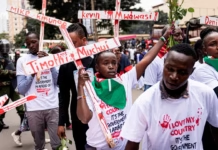A petition has been lodged in Kenya’s courts seeking to halt the appointments of prominent opposition leaders—John Mbadi, Hassan Joho, Opiyo Wandayi, and Wycliffe Oparanya—into the Cabinet.
The petition, filed by Julius Ogogoh through the Commission for Human Rights and Justice, raises significant constitutional concerns regarding the role of the opposition in government oversight.
The document asserts that the inclusion of these leaders in the Cabinet would directly conflict with their constitutional mandate to provide checks and balances on the executive branch of government.
The petition argues, “Given the fact that the Interested Parties as members of the official opposition coalition in the National Assembly have a constitutional duty to oversee the function of the Executive and other arms of the government, the nomination and appointment of the Interested Parties into the cabinet and/or government as secretaries shall conflict with their constitutional duty bestowed upon the opposition party by the people of Kenya and the constitution to … provide oversight.”
The petitioners argue that the erosion of the opposition’s role would lead to a myriad of implications for accountability and transparency within the government.
They contend that the citizens of Kenya stand to suffer “great prejudice and a violation and infringement” of their constitutional rights, as the appointments would represent a breach of trust placed in the Azimio la Umoja-One Kenya Alliance coalition and the Orange Democratic Party.
Critics of the proposed appointments have expressed growing concerns that integrating opposition leaders into the Cabinet could undermine the essential checks and balances that the opposition is obligated to fulfill.
They argue that a strong opposition is crucial for democratic governance, as it holds the ruling party accountable and represents diverse views within the political arena.
As the political landscape in Kenya continues to evolve, the implications of this petition could have far-reaching consequences for the governance structure.
The case may set a precedent regarding the limitations of cabinet appointments from the opposition and their potential to conflict with the principles of democratic oversight.
The petition has attracted significant public attention, with many Kenyans weighing in on social media platforms, debating the merits and potential consequences of the opposition leaders taking up Cabinet positions.
Legal experts have indicated that the outcome of this petition could influence not only the current political climate but also future appointments within the Kenyan government.



















